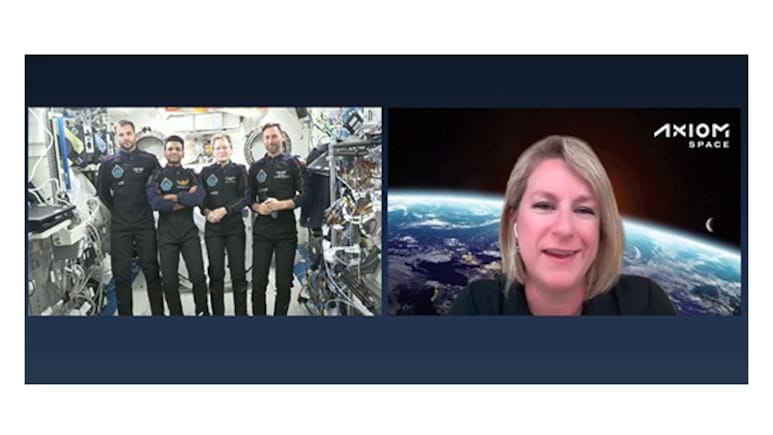
In a historic leap for India's human spaceflight ambitions, Group Captain Shubhanshu Shukla, whose call sign is "Shux," completed an 18-day journey aboard the International Space Station (ISS) as part of the Axiom 4 mission, often called 'Mission Akash Ganga'.
The Axiom 4 mission, led by US-based Axiom Space, was the most science-intensive mission the company has flown to date, with over 60 experiments conducted in microgravity. Among the crew were three rookies from India, Poland and Hungary and one veteran astronaut Commander Peggy Whitson from the US, each contributing to a diverse portfolio of research spanning life sciences, plant biology, technology demonstrations, and STEM outreach.
"They more than exceeded my expectations," said Dr Lucie Low, a neurobiologist and Chief Scientist at Axiom Space, in an exclusive conversation with NDTV.
"The Axiom 4 crew were absolutely extraordinary at all of the activities that they undertook. From the science perspective, they had the busiest portfolio that we have had on a mission to date."
While the mission was a team effort, Group Captain Shukla stood out for his remarkable adaptability and dedication. A trained fighter pilot from the Indian Air Force, he embraced the challenge of becoming a "scientist" in space, mastering conducting complex experiments in microgravity - a notoriously unpredictable environment where even simple tasks can become difficult.
"Shux, as a fighter pilot, did an extraordinary job of learning all of the science, performing it in microgravity, which can be very challenging at times," Dr Low noted. "Things don't necessarily react in the way that you expect them to. And things tend to float away if you're trying to keep hold of them. He did an absolutely wonderful job of performing all of the experiments."
Among the highlights of Group Captain Shukla's contributions were experiments on plant sprouting in space, muscle regeneration, and fluid dynamics. He also led several demonstrations aimed at inspiring students across India, explaining how the digestive system and other biological processes behave in space.
"He helped explain, for example, how the digestive system works in space, how fluids behave in space, and how all kinds of things are very different in space," said Dr Low. "He did an absolutely fantastic job of inspiring an entire continent of young people, I think, who are going to want to be astronauts in future as well."
India's participation in the Axiom 4 mission is more than symbolic-it's strategic. With seven experiments flown by Indian scientists, mostly focused on agriculture and food, the mission served as a training ground for ISRO's Gaganyaan program, which aims to send Indian astronauts into space, build a national space station by 2035, and eventually land an Indian on the Moon by 2040.
"Everything that India is doing, it's not just necessarily about flying simple seeds to space," emphasised Dr Low. "It's also about learning the experience of how do you fly an experiment in space? How do you train a fighter pilot to become a 'scientist' in space? How do you learn these processes that enable a nation to live and work successfully in space?"
The mission's success has energised India's space community and validated its approach to human spaceflight. The collaboration with Axiom Space provided ISRO with invaluable insights into astronaut training, experiment design, and space operations, skills that will be crucial as India prepares for its crewed missions.
"Everything that ISRO and India have done with the Axiom-4 mission has been learning those skills, learning that equipment, learning those processes," Dr Low added. "And this is all tremendously supportive to the Gaganyaan program."
As the mission concluded, the sentiment from Dr Low was that the Mission Akash Ganga was a resounding success.
"It was a fantastic mission. The crew did a phenomenal job. The science is really exciting," said Dr Low. "We're so proud of them, of all the crew's work, and we're so delighted that our researchers around the world were able to get their results data, their data back, their results back. We can't wait to see the papers and the publications start coming out to tell the world about that research."
With Group Captain Shukla's stellar performance and India's growing expertise in space science, the Axiom-4 Mission has laid a strong foundation for the Gaganyaan program. It's not just a mission - it's a milestone in India's journey to becoming a human space flight-faring nation. At 39 years of age, Mr Shukla has a long way to go to make India's human space program a success.
Track Latest News Live on NDTV.com and get news updates from India and around the world

